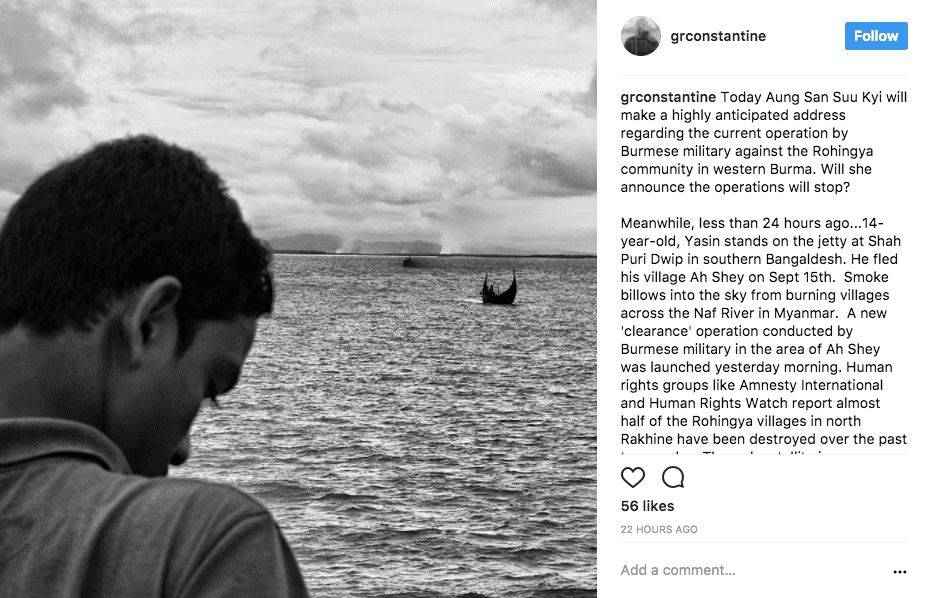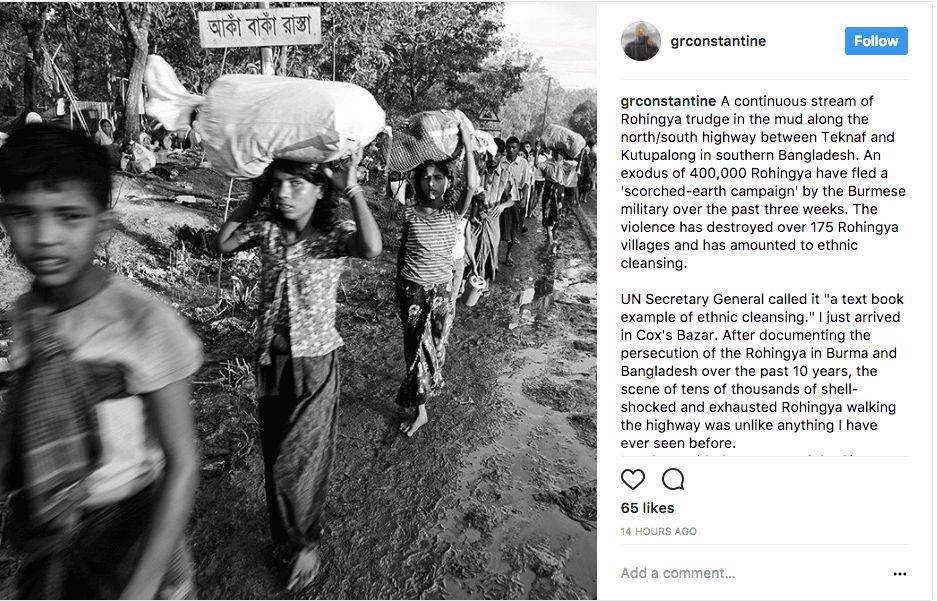The plight of Muslim Rohingya: What does their future hold?
On August 25th The Myanmar government undertook a horrific crackdown on the minority Muslim Rohingya living in the Rakhine state of west Myanmar. Arakan Salvation Army militants coordinated numerous attacks on 30 Myanmar police outposts and an army base. In response, the Myanmar army and other armed ethnic groups hostile to the Rohingya initiated a string of mass atrocities including; attacks on villages, burning of homes, and widespread reports of rape. As a product, there has been mass exodus- over 300,000 currently reported Rohingya fleeing to nearby borders in Bangladesh
Photo: Greg Constantine
What’s the background?
The Rohingya are a Muslim ethnic minority living in the Rakhine state of West Myanmar. The Myanmar nationality law (1982) does not legally recognize Rohingya as citizens, and has historically subjected this ethnic group to discrimination, abuse and neglect. The Myanmar government insists that all Rohingya are immigrants from Bangladesh, despite living in the Rakhine state for generations. In effect, the Rohingya are subject to marriage and child-birth restrictions, statelessness, and have limited access to health care, schools, jobs, and freedom of movement.
In 2012, following the alleged gang rape of an ethnic Rakhine woman by three Muslim Rohingya males, tensions between Muslim Rohingya and the predominantly Buddhist Rakhine population erupted. Targeted attacks and rioting forced tens of thousands of Rohingya to flee into nearby displacement camps.
IDC member Fortify Rights exposed local orders and internal government documents in 2014, revealing severe restrictions on freedom of movement, marriage, childbirth, and other aspects of daily life for more than one million Rohingya Muslims in Rakhine State. The government continues to confine more than 120,000 people—mostly Rohingya survivors of 2012 violence—to 38 internment camps in eight townships in Rakhine State.
On August 23rd, 2016, Myanmar state counsellor Aung San Suu Kyi established a nine- member advisory commission on the Rakhine state. The aim of the committee was to address underdevelopment and humanitarian issues surrounding Muslim Rohingya.
In October 2016, Rohingya militants attacked Myanmar police outposts in the North of Myanmar’s Rakhine state in response to the continued systematic persecution of Muslim Rohingya. In response, the Myanmar army launched a massive crackdown on the entire Rohingya population. Amnesty International have documented widespread extensive and horrific human rights abuses on Muslim Rohingya as a result. Unlawful killings, arbitrary arrests, rape and sexual assault of women and girls, and the burning of more than 1,200 buildings, including schools and mosques were included. This crackdown displaced more than 80,000 Rohingya Muslims and sent them fleeing into nearby Bangladesh.
Following the Myanmar Army’s crackdown in northern Rakhine State in October, the U.N. Human Rights Council passed a landmark resolution on March 24 ordering an independent, international Fact-Finding Mission to investigate human rights violations and abuses in Myanmar’s Rakhine State. The President of the Human Rights Council appointed three experts to lead the mission.
IDC member Fortify Rights recommended that the Fact-Finding Mission focus on human rights violations by state and non-state actors in Rakhine, Kachin, and Shan states. The Government of Myanmar “disassociated” itself from the resolution. Suu Kyi explained that her government would not cooperate with the Mission. The Myanmar military and Suu Kyi’s offices have routinely denied allegations of serious human rights violations in Rakhine State since October 2016. On August 6, another commission appointed by Suu Kyi and led by Vice President Myint Swe dismissed allegations of serious human rights violations in Maungdaw Township since October.
Latest developments
IDC member Human Rights Watch has obtained satellite data and images that are consistent with widespread burnings in northern Rakhine State, encompassing the townships of Rathedaung, Buthidaung, and Maungdaw. To date, Human Rights Watch has found 21 unique locations where heat sensing technology on satellites identified significant, large fires.
Matthew Smith, the Chief Executive Officer for Fortify Rights has stated that “Mass atrocity crimes are continuing. The civilian government and military need to do everything in their power to immediately prevent more attacks.” Fortify Rights interviewed 24 survivors and eyewitnesses of attacks in the last week from 17 villages in the three townships of northern Rakhine State—Maungdaw, Buthidaung, and Rathedaung. Survivors and eyewitnesses described mass killings and arson attacks by the Myanmar Army, Myanmar Police Force, Lon Tein (“security guards”) riot police, and local armed-civilians.
HRW argues that Suu Kyi’s inflammatory propaganda is fueling anti-Rohingya and anti-aid-worker sentiment at a time when she should be doing everything in her power to instill calm, promote human rights, and open more humanitarian space. “Rather than deal with ongoing atrocities, the Suu Kyi government has tried to hide behind the Advisory Commission,” said Matthew Smith “The Commission responded with concrete recommendations to end violations, and the government should act on them without delay.”
Between the Annan Commission, U.N. fact finders, and Myanmar’s own civil society, the government has an opportunity make real progress in ending and remedying atrocities,” said Matthew Smith. “Some officials are looking to sweep Rakhine under the rug. The military and civilian authorities should cooperate with international efforts to establish the facts and hold perpetrators accountable. There’s no other way forward.”
Bangladesh: Despite being the main destination for Rohingya, resources are stretching thin
Sharing a border with Myanmar, Bangladesh has remained the main destination for Rohingya fleeing violent persecution. Since August 23rd however, Bangladesh has stressed that it cannot cope; lacking the food, water and shelter resources necessary to absorb the massive influx of Rohingya. In effect, as the crisis continues, Bangladesh has become less accommodative of Rohingya refugees. There are at least 400,000 Rohingya living in squalid camps already in Bangladesh, and the latest UN figures have estimated around 409,000 have recently entered Bangladesh from Myanmar since violence erupted. This has led to Bangladeshi border authorities to deny the entry of Rohingya into Bangladesh where they can, and confine them to the Cox’s Bazaar area near the border. This report is supported by numerous other reports of authorities leaving thousands stranded on the border in makeshift camps.
Bangladesh is aware that is in the midst of an intense humanitarian crisis, and isn’t equipped to deal with the influx of refugees. “We are stopping them wherever we can, but there are areas where we can’t stop them because of the nature of the border; forests, hills,” said H.T. Imam, Prime Minister Sheikh Hasina’s political adviser. In effect, Bangladesh has given serious consideration to relocate Rohingya to an Island named Thengar Char. Makeshift camps in Cox’s Bazar in south-east Bangladesh have grown so rapidly since the crisis, they have run out of space.
Malaysia and Thailand: Prepared to shelter Rohingya, but immigration detention seems likely
Zulkifli Abu Bakar, the director-general of the Malaysia Maritime Enforcement Agency has claimed that it is ready and willing to provide shelter for Muslim Rohingya fleeing violence and persecution in Myanmar. As a Muslim-majority nation already home to more than 100,000 Rohingya refugees, Malaysia will probably house the new arrivals in immigration detention centers. Illegal entry and stay policy in Malaysia is criminalized, and immigration detention is where foreigners without documents are typically held.
At the same time, a protest on 30 August by the Rohingya against recent events in Myanmar saw more than a hundred Rohingya arrested and detained, with some subsequently charged for entering into Malaysia without valid travel documents. In response, hundreds of ethnic Rohingya protestors have gathered in the Malaysian capital of Kuala Lumpur (Wednesday Aug 30) demanding an end to the bloodshed in Rakhine.
Thailand, navy spokesman Chumpol Lumpiganon said the government and the navy are preparing to deal with hundreds of Rohingya migrants who flee violence by boats and often drift into Thai waters. The Third Fleet, which oversees the Andaman Sea, and the navy operation centre, has been put on alert along the Andaman coast from Ranong to Satun. The navy will provide assistance to the migrants on humanitarian grounds and authorities will not push them out to sea if they do not plan to travel to a third country. If Rohingya are spotted in Thai waters, the navy will extend assistance in line with international practices. As far as providing shelter, and the possibility of immigration detention, Thailand has not commented. Given Thailand’s history of immigration detention policy, it is likely that such an approach will apply to Rohingya.
In both Malaysia and Thailand, many Rohingya are currently held in immigration detention facilities that fall far below minimum international standards, and in the case of Thailand in particular, Rohingya can be subject to indefinite detention.
Immigration detention should always be a last resort. No one should be subject to indefinite detention. Governments should implement alternatives to detention that ensure the protection of the rights, dignity and wellbeing of individuals. These basic minimum human rights standards are often breached, when there aren’t defined limits on the length of detention.
There are alternatives to detention that better respect the human rights of refugees, asylum seekers and migrants. Further, alternatives cost 80% less than immigration detention. In the case of people who are stateless, detention should never be used.
India: Already home to thousands of Rohingya, and unlikely to accept more
While in the past India had welcomed Rohingya refugees, a rise in nationalist and anti-Islamic sentiments have prompted demands for their deportation.
Due to discourse undertaken by Suu Kyi, there is an idea surrounding fleeing Rohingya as comprising mostly of Islamic terrorists. India worries that these refugees pose a security risk to India, and may further radicalize the existing political environment, In effect, around 40,000 undocumented migrants may be deported if India decides to do so. Ultimately, India are not accommodative of fleeing Rohingya and unless it is pressured by the international community, it probably won’t be swayed.
This article was authored by Jorge Nicholas as part of Asia Pacific Communications Internship.

